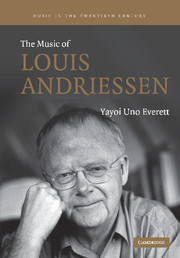Book contents
- Frontmatter
- Contents
- List of music examples and figures
- Acknowledgements
- List of abbreviations
- Introduction
- 1 Dutch music in the twentieth century
- 2 Formative years
- 3 Politics and “concept” works
- 4 Toward the metaphysical in art (1981–88)
- 5 Ramifications
- 6 Operatic collaboration with Peter Greenaway
- 7 Contemplative works
- 8 Epilogue
- Bibliography
- Index
3 - Politics and “concept” works
Published online by Cambridge University Press: 22 September 2009
- Frontmatter
- Contents
- List of music examples and figures
- Acknowledgements
- List of abbreviations
- Introduction
- 1 Dutch music in the twentieth century
- 2 Formative years
- 3 Politics and “concept” works
- 4 Toward the metaphysical in art (1981–88)
- 5 Ramifications
- 6 Operatic collaboration with Peter Greenaway
- 7 Contemplative works
- 8 Epilogue
- Bibliography
- Index
Summary
The real politics of music are made apparent by the way in which it is produced. These forms of production (and we should allow ourselves at least one Marxist concept while we are crossing the cultural landscape), for a composer these production forms initially imply the actual musicians… Who are you composing for: who's going to play, where's it going to be played and for whom. If you ask yourself these questions and try to come up with some kind of answer then you're already deeply immersed in the field of cultural politics.
– Andriessen (1980: 100)The year 1965 was marked by massive anti-Vietnam war protests in Washington, the Berkeley student-teach-in, race riots in Los Angeles, and Martin Luther King's march for integration, among other social uprisings (Gitlin 1993). Events related to American imperialism triggered revolutionary student protests all across the globe from Tokyo to Berlin. Influenced by the American counterculture and its struggle for social equality, the postwar generation of Dutch youth waged its own battle against the conservative government and cultural authorities within Holland. Andriessen cut short his second year of compositional study with Berio in Berlin to return to Amsterdam in November of 1965, only to find himself in the midst of a socio-political revolution unfolding on an unprecedented scale.
The 1970s signified a major turning point in his compositional career.
- Type
- Chapter
- Information
- The Music of Louis Andriessen , pp. 59 - 99Publisher: Cambridge University PressPrint publication year: 2007

